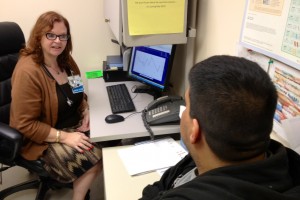Public health implications as people who stop taking HIV medications can quickly become infectious

A major goal of the federal health care law is that millions of people who currently do not have health insurance will have improved access to care. But the massive overhaul is also expected to be widely disruptive, and doctors worry that many people with chronic illness could suffer during the changeover, as KQED's Mina Kim details today on The California Report.
Kim tells the story of 33-year-old Andrew Solis who stopped taking HIV medications more than a year ago after becoming addicted to methamphetamine while in a "rocky relationship." He resumed treatment at the Oakland Highland Hospital HIV clinic last October after ending the relationship.
Solis has been able to get back in to treatment fairly easily, Kiim reports. But changes coming under the Affordable Care Act could complicate care for clinic patients, says Kathleen Clanon, chief medical officer at Highland Hospital.
From Kim's report:
"They are all poor basically. It's been 15 years or so since HIV was really a disease in the U.S. of middle-class men. It's been a disease of poverty in the U.S., really, for about 15 years now."
Right now, low-income patients without insurance get their health care paid for by the federal Ryan White program which only covers HIV related care. In order for them to get the full benefits of the Affordable Care Act, they'll need to move to a more traditional insurance-based care. For starters, they'll have to first choose an insurance carrier and a primary care doctor and Clanon says, that won't always be easy.
"Most of the information that goes to people about their choices and how they're becoming insured is going to come by snail mail, and people who are low-income frequently don't have stable addresses, and the majority of my patients don't have regular access to the internet."
If her patients don't fill out the paperwork, they will be automatically assigned to a primary doctor -- one that Clanon says is unlikely to have a specialty in HIV care. Or worse, she fears her patients won't tell their new doctor that they're infected, because of stigma surrounding people with the virus.
"I have a patient that I saw about a month ago, he needed to move in with his mom. However she was so afraid of him that she was making him eat in his room off paper plates that she would then throw away. So stigma will make it difficult for people to fix any weirdness that happens in terms of where they get assigned."
And people with HIV, Clanon says, don't have time to be away from treatment.
"Within a week, ten days, two weeks, if you stop taking your HIV medication, the virus comes back. And treatment interruptions are dangerous for people with HIV, they're dangerous for their health, and they're dangerous for our whole community because during that time that person is infectious to others."
Still, the Affordable Care Act earmarks money to deal with all that paperwork. Covered California, the state's new health insurance marketplace will soon announce grants totaling $49 million for education and outreach. Much of the money is expected to be awarded to community groups which have extensive networks in ethnic and low-income populations -- the very people who might have the most trouble navigating the new system.